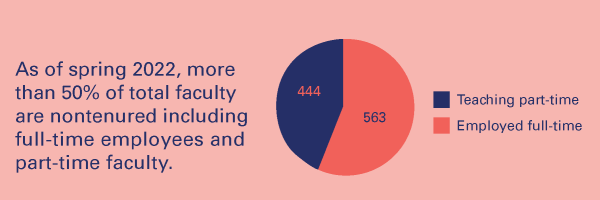New career advancement opportunities will become available to faculty with the introduction of the new Instructional Faculty Title Series for qualified instructional faculty.
Taking effect Sept. 1, nontenured lecturers and senior lecturers will be able to be appointed to new titles and ranks, including assistant professor, associate professor or professor of instruction.
“In collaboration with their academic units, current lecturers and senior lecturers will determine whether to pursue the new title and rank or remain in their current job title,” the Instructional Faculty Title Series website stated. “This opportunity will be available to approximately 500 faculty members.”
The Texas State University Faculty Senate and the Nontenure Line Faculty Committee worked for the implementation of this title series, which would provide equal career path opportunities like pay bumps and paths toward promotions for instructional faculty, such as the nontenured-line faculty.
Nontenure-line faculty constitutes over 50% of the total faculty at Texas State with over 500 being employed full-time and over 400 teaching part-time.
In the tenure-line track, professors start off in the assistant professor level working their way to associate professor level till finally full professor level.
Nontenure-line faculty are unable to easily move up these ranks staying in lecturer or senior lecturer positions.
Rachel Davenport, chair of the Nontenure Line Faculty Committee said tenured and nontenured faculty received different career path opportunities, with tenured-line faculty having a higher level of job security and promotion opportunities. Before the introduction of the new title series, nontenure faculty would experience significant pay gaps and no promotion-eligible line, unlike tenure-line faculty.
“We don’t have any promotion eligible line. We are hired in at whatever our job title is. It’s usually either lecturer or senior lecturer and then you just stay there forever. There’s never a raise,” Davenport said.
Every department will be in charge of discussing guidelines and deciding requirements and qualifications for lecturers. By April 19, all decisions to either transition to the title series or remain with current job titles must be notified to their respective academic units.
Based on the stated title series and the academic unit’s own requirements, Davenport said during this one-time conversation not everyone will be placed at the lowest title or rank level and could potentially be placed in either assistant, associate or full level.
“What that process is going to look like is different depending on what department or school you’re in,” Davenport said. “It’s not just about how long you’ve been doing it, but on are you meeting other qualifications or are you doing a good job at teaching? Are you doing a good job at service?”
According to the Faculty of Instruction appointment guidelines, the title series is amongst Texas State’s efforts to enhance the capacity and productivity of teaching, learning and instructional contributions.
“Instructional faculty, including lecturers and senior lecturers, play a critical role in advancing Texas State’s academic mission. The university is committed to ensuring career advancement opportunities for instructional faculty. Texas State continues to gather information on the process and is collaborating with all stakeholders to refine the implementation,” Texas State said in a written statement to The University Star.
A sense of community amongst faculty, more shared governance and a decrease in turnover are only some of the outcomes Davenport said there is hope for under the use of the title series.
“We’re going to prove to [faculty] they belong here and we want them to have their careers here,” Davenport said. “We actually feel like we are incorporated and embedded in the university where values are important, just like everyone else.”
For more information, visit the Instructional Faculty Title Series website.






















